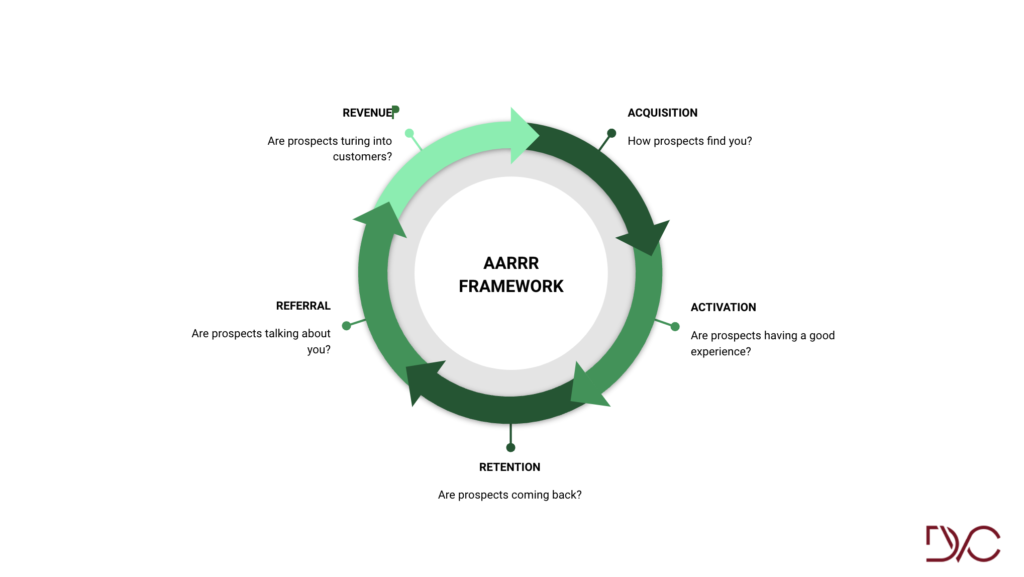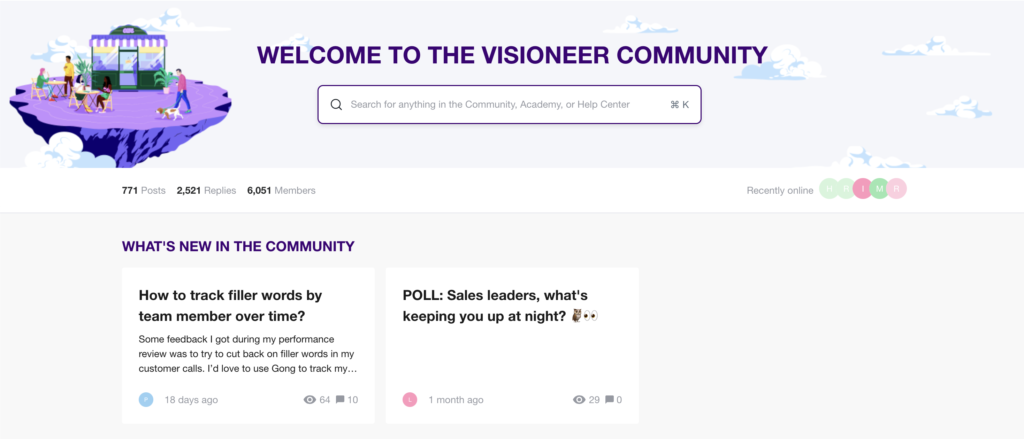Marketing is ever-evolving. What worked until a few years ago, no longer works. Similarly, what never used to work is now helping companies acquire new customers, become recognized brands, and grow faster than their competitors. Part of what’s helped startups and companies achieve this is growth marketing.
Table of Contents
What is Growth Marketing?
Growth marketing is a customer-centric approach that relies purely on data and experimentation to expedite growth. At its core, SEO, paid media, email marketing, conversion rate optimization (CRO), and social media to name a few are all strategies you would use for growth marketing, you would use the collected data to make continuous improvements. Growth marketing for startups is based on the AARRR framework. This is an acronym for acquisition, activation, retention, recommendation, and revenue. 
Growth Marketing for Startups
For any startup, growing your business and acquiring customers is a priority. And the more you raise, the more real this pressure becomes. But with limited resources and budget, you cannot aim big. This is why growth marketing for startups is such a crucial play. Essentially, you are running a combination of paid and organic marketing strategies, gathering data and pivoting quickly to get the right results. Startups emphasize growth marketing today to build repeatable and scalable marketing strategies for sustainable growth. However, growth marketing isn’t just for new startups, it is equally as important for Series A and B companies to continue that growth trajectory. Despite how exciting and effective growth marketing is for startups, it is important to first lay the foundation. When starting with growth marketing, you need to take a step back and hit the drawing board to focus on two details.
Growth Goals. Whether short-term or long-term objectives, having growth goals before starting on the implementation is crucial. Review your plans, and set specific goals. Though growth marketing brings rapid growth, it still takes a bit of time.
Define Your Audience. How well you know your audience is how well you will be able to execute your growth marketing strategy. This is mainly because different audiences use different channels, have different interests, and engage differently.
At the growth marketing stage, you want to make sure your budget is effectively spent and you are reaching your defined audience.
Growth Marketing Strategies for Startups
1. Founder-Led Marketing
Startups, especially early on, have a lot of trust to build with their audience. Founder-led marketing is one of the ways to initiate the process and is likely to become a critical piece of your growth marketing strategy. Founder-led marketing within itself is a strategy where the founder takes a visible and active role in marketing. From appearing on podcasts to running webinars, the founder embodies the company’s vision and mission.
This visibility helps build a loyal following and establishes you as an industry expert. Over the years, we have seen tech CEOs take the front seat when it comes to building their brand to connect their audiences to the companies they run. A study by Edelman revealed that 81% of consumers said they need to trust the brand to do what is right, and a founder’s active presence can greatly influence this trust.
2. Product-Led Growth
If you visit Apollo.io — despite being a paid software, you will still be able to sign up and use the platform. Sounds great right? However, in the free version, you are limited. For example, you cannot view click or open rates. But you can continue using the tool. Apollo.io then offers you a free trial of their paid tiers. This is where you get full access to their features for 14 days. If you like it, you buy it. In the entire process, no rep reaches out to you directly to sell you the service.
There are no demos or long calls. Apollo lets its tool sell itself. That’s product-led growth. Product-led growth can start with a freemium model, where users can sign up and use your tool but are limited by features. Once they have had a good handle on the tool and need to upgrade to use important features, they will upgrade. During the freemium period, automated email marketing campaigns can help nurture the prospect by showcasing premium features and you can use your product to display premium features as well.
3. Paid Advertising
Much like traditional advertising, paid ads are critical in growth marketing as well. However, as part of your growth marketing play, paid ads are monitored consistently, tweaked, and optimized to perform better every week. In most cases, when starting, startups aren’t too sure about paid advertising and we get it, you’re busy, unsure of how it works, and limited by budget. But this is exactly what growth marketing helps conquer. By no means you are required to spend $100K per month only to wait and see what sticks.
That’s how paid advertising used to work. Growth marketing is where you start small, and as you go along, identify trends, and understand the numbers, ads, and channels that are working only then do you optimize and inject more budget. We advise our clients to look at the full-funnel journey of paid advertising. For instance, the number of leads is not your return. It is the number of leads that convert to sales-qualified leads and customers that is important.
You can talk about growth marketing for your startup here.
4. Content Marketing
Content is the spine of any marketing strategy. Creating valuable, relevant content can attract and engage your target audience. By consistently producing content that addresses your audience’s pain points can establish your authority in your industry. And the better the content and momentum, the better the growth. So, startups can create a series of blog posts, case studies, and webinars that solve problems. These resources not only educate your audience but create opportunities for you to nurture them into a sales funnel. And the best part? It is cost-effective!
According to Hubspot, companies that are consistent with blogging receive 55% more website visitors than those that don’t. Moreover, 74% of companies also reported that content marketing increases the number of leads they generate.
5. Search Engine Optimization
6. Referral Program
You built a product your industry needs, great! You have some customers who use it — even better. But you are not using your happy customers to spread the word and refer others in the industry to you. There are a variety of ways to build out referral programs — you can reward gifts, discounts, and even donations to their favorite charities. Referral programs are a great way to grow your startup and a key component of your growth marketing strategy. When peers or colleagues refer you, you automatically have a slight level of trust. At this point, you know someone well who is referring you to a startup that they have experienced. Chances are you will be getting into these sales conversations differently. To build out your referral program, be sure to consider:
- Can your champions accept gifts, if not, what’s the alternative?
- What is your overall goal with referrals?
7. Partnerships
One powerful growth marketing strategy that is often overlooked is partnerships. Startups can partner with complementary companies to leverage access to their market and expand their customer base. For instance, if you are an LMS startup, you can build partnerships with content providers like Udemy or LinkedIn Learning. According to Accenture, 76% of companies reported partnerships being a key factor in driving growth while 54% stated it drives 20% of their total revenue.
However, partnerships aren’t just about integrations and referring business honestly. A great partnership can help open doors for marketing collaborations as well. As a founder of a startup, you can be invited to your partner’s webinar, which positions you to be an expert in your space and your partner’s audience gets to hear from you directly. This piques their interest in your startup and convert to leads high-quality leads seamlessly.
8. Community
Community building is another growth marketing strategy startups must use. Startups can successfully drive organic growth through engagement, advocacy, and referrals when they build a space for their customers and prospects to connect. Most companies and startups would build a community focusing on their ICPs. For example, companies like Gong have a community for sales professionals, Demandbase has a community for GTM leaders and 360Learning has a community for learning and development professionals.

According to a study by Higher Logic, 49% of companies with online communities reported a 10% increase in customer retention, while 27% saw a 20% increase in customer lifetime value.
Additionally, a strong community can significantly reduce marketing costs, as engaged members often generate user-generated content, provide valuable insights, and serve as a trusted source of recommendations.
9. Email Marketing
An often underutilized growth marketing strategy for startups is email marketing. Email marketing is a great way to directly reach your audience with personalized content, drive engagement, conversions, and retain customers. One of the greatest parts of email marketing comes with its ability to be automated. From sending emails when prospects sign up, close, or visit high-intent pages.
According to a report by the Direct Marketing Association, email marketing yields an average return on investment (ROI) of $42 for every $1 spent, making it one of the most cost-effective marketing channels. Moreover, personalized email campaigns can result in a 29% higher open rate and a 41% higher click-through rate compared to non-segmented campaigns, as reported by HubSpot.
Conclusion
Growth marketing for startups is an effective way to acquire new customers, generate traffic, and begin building brand awareness. Though marketing is often the main driving force for startups, it is often overlooked early on by startups. This is probably because you have limited budgets, don’t have enough time, and are focused too much on the product and closing deals.
Now, those are all important, but so is marketing. Growth marketing helps startups optimize their budgets so they are not blindly wasting their seed money and with the numbers you can figure quickly what to invest in.
DVC is a growth marketing agency backed by over a decade of growth marketing experience in building and implementing strategies for startups. As an extension of your team, we align with your business strategy to drive rapid and sustainable results. Connect with us for a strategy call today.

